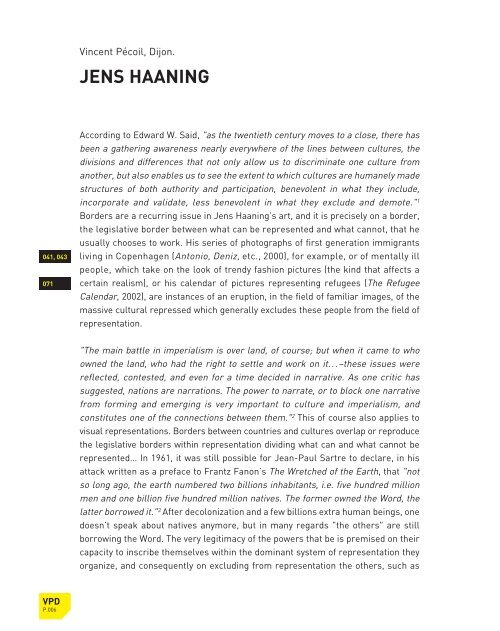download catalogue high resolution pdf (22.3 mb) - Jens Haaning
download catalogue high resolution pdf (22.3 mb) - Jens Haaning
download catalogue high resolution pdf (22.3 mb) - Jens Haaning
You also want an ePaper? Increase the reach of your titles
YUMPU automatically turns print PDFs into web optimized ePapers that Google loves.
041, 043<br />
071<br />
VPD<br />
P.006<br />
Vincent Pécoil, Dijon.<br />
JENS HAANING<br />
According to Edward W. Said, "as the twentieth century moves to a close, there has<br />
been a gathering awareness nearly everywhere of the lines between cultures, the<br />
divisions and differences that not only allow us to discriminate one culture from<br />
another, but also enables us to see the extent to which cultures are humanely made<br />
structures of both authority and participation, benevolent in what they include,<br />
incorporate and validate, less benevolent in what they exclude and demote." 1<br />
Borders are a recurring issue in <strong>Jens</strong> <strong>Haaning</strong>’s art, and it is precisely on a border,<br />
the legislative border between what can be represented and what cannot, that he<br />
usually chooses to work. His series of photographs of first generation immigrants<br />
living in Copenhagen (Antonio, Deniz, etc., 2000), for example, or of mentally ill<br />
people, which take on the look of trendy fashion pictures (the kind that affects a<br />
certain realism), or his calendar of pictures representing refugees (The Refugee<br />
Calendar, 2002), are instances of an eruption, in the field of familiar images, of the<br />
massive cultural repressed which generally excludes these people from the field of<br />
representation.<br />
"The main battle in imperialism is over land, of course; but when it came to who<br />
owned the land, who had the right to settle and work on it. . . –these issues were<br />
reflected, contested, and even for a time decided in narrative. As one critic has<br />
suggested, nations are narrations. The power to narrate, or to block one narrative<br />
from forming and emerging is very important to culture and imperialism, and<br />
constitutes one of the connections between them." 2 This of course also applies to<br />
visual representations. Borders between countries and cultures overlap or reproduce<br />
the legislative borders within representation dividing what can and what cannot be<br />
represented… In 1961, it was still possible for Jean-Paul Sartre to declare, in his<br />
attack written as a preface to Frantz Fanon’s The Wretched of the Earth, that "not<br />
so long ago, the earth nu<strong>mb</strong>ered two billions inhabitants, i.e. five hundred million<br />
men and one billion five hundred million natives. The former owned the Word, the<br />
latter borrowed it." 3 After decolonization and a few billions extra human beings, one<br />
doesn’t speak about natives anymore, but in many regards "the others" are still<br />
borrowing the Word. The very legitimacy of the powers that be is premised on their<br />
capacity to inscribe themselves within the dominant system of representation they<br />
organize, and consequently on excluding from representation the others, such as


